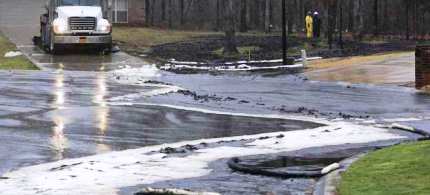
And Why Would Anyone Distrust ExxonMobil?
William Boardman, Reader Supported News
How big a hole does it take to make a major oil spill?
Men wearing protective clothing survey cleanup efforts where an underground crude oil pipeline ruptured in Mayflower, Arkansas, 03/30/13. (photo: Reuters
 t took less than an hour for something like 5,000 barrels (at 42 gallons per barrel) of ExxonMobil's tar sands oil to flow into a residential neighborhood and surrounding wetlands in Mayflower, Arkansas, on March 29, once the company's Pegasus pipeline had opened a two-inch hole along its top surface. The hole was also over 22 feet long and made the pipe look like a split sausage.
t took less than an hour for something like 5,000 barrels (at 42 gallons per barrel) of ExxonMobil's tar sands oil to flow into a residential neighborhood and surrounding wetlands in Mayflower, Arkansas, on March 29, once the company's Pegasus pipeline had opened a two-inch hole along its top surface. The hole was also over 22 feet long and made the pipe look like a split sausage.
The first pictures of the pipeline gash came from the law firm suing ExxonMobil on behalf of those hurt by the spill. The Duncan Firm of Little Rock posted four pictures on its Facebook page April 11, following an on-site inspection the previous day.
That was the same day that ExxonMobil complied with a subpoena and delivered 12,587 pages of documents, including hundreds of plans and blueprints, to Arkansas attorney general Dustin McDaniel. Commenting on the 22-foot-long, 2-inch-wide, smooth split in the pipeline, McDaniel said, "The pipeline rupture is substantially larger than many of us initially thought."
Also that day, April 10, the Huffington Post ran a detailed story about widespread health complaints among people living near the pipeline and as much as a mile or more away. The next day, the Arkansas Times had a much longer story about the town with the headline: "Will Mayflower ever be the same after the Exxon spill?" Not surprisingly, there was no one who thought so.
Arkansas Paper Hears Ticking Time Bomb
The Arkansas Times story notes in passing "the still-ticking time bomb on the shores of Central Arkansas's primary water source, Lake Maumelle, where the Pegasus pipeline comes within 600 feet of the shoreline."
And the Duncan Firm is reaching out to people along the full 300-mile length of the pipeline in Arkansas, suggesting on Facebook: "If this pipeline runs through your property you may have a claim for damages."
None of this information came from ExxonMobil. Late on April 11, the ExxonMobil web site's freshest news was a Unified Command press release from April 10, featuring the usual good news about the air, water, fish, and residents.
April 10 looks like the day ExxonMobil lost control of the story, at least for the moment.
Despite sketchy mainstream media coverage outside Arkansas, enforced by a county sheriff's department obedient to ExxonMobil directives, the increased flow of news from the Duncan Firm, the attorney general, and a local population losing patience with ExxonMobil's promises will be much harder for America's most profitable corporation to control.
And Why Would Anyone Distrust ExxonMobil?
Some days ago, ExxonMobil gave four families well-publicized permission to return to their homes. The families chose not to return, because the Arkansas Department of Health suggested they wait until air quality tests confirmed it was safe.
On April 10, ExxonMobil reported "Fish in the main body of Lake Conway have not been affected." The press release acknowledged obliquely that a cove that is part of the lake already had tar sands oil in it, but tried to reassure the reader that that was as far as the diluted bitumen and its unknown, multiple chemical components would go.
One Mayflower resident who lives near that cove went to an ExxonMobil community meeting April 7 and heard an ExxonMobil panel of four guarantee that there was no tar sands oil in the cove. After the meeting, he went home and saw tar sands oil in the cove.
The Duncan Firm is pursuing the class action suit against ExxonMobil in federal court. On local TV on April 9, attorney Philip Duncan, founder of the Duncan Firm, said he expected the class of Arkansans harmed by ExxonMobil to grow into the hundreds.
William M. Boardman has over 40 years experience in theatre, radio, TV, print journalism, and non-fiction, including 20 years in the Vermont judiciary. He has received honors from Writers Guild of America, Corporation for Public Broadcasting, Vermont Life magazine, and an Emmy Award nomination from the Academy of Television Arts and Sciences.
Reader Supported News is the Publication of Origin for this work. Permission to republish is freely granted with credit and a link back to Reader Supported News.

